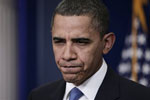 AFP: US President Barack Obama on Tuesday imposed new economic sanctions on Iran’s oil export sector and on a pair of Chinese and Iraqi banks accused of doing business with Tehran. By Tangi Quemener
AFP: US President Barack Obama on Tuesday imposed new economic sanctions on Iran’s oil export sector and on a pair of Chinese and Iraqi banks accused of doing business with Tehran. By Tangi Quemener
 WASHINGTON (AFP)— US President Barack Obama on Tuesday imposed new economic sanctions on Iran’s oil export sector and on a pair of Chinese and Iraqi banks accused of doing business with Tehran.
WASHINGTON (AFP)— US President Barack Obama on Tuesday imposed new economic sanctions on Iran’s oil export sector and on a pair of Chinese and Iraqi banks accused of doing business with Tehran.
In a statement released by the White House, Obama said the new measures underlined the United States’ determination to force Tehran “to meet its international obligations” in nuclear negotiations.
The sanctions came on the same day as the US State Department branded Iran “an active state sponsor of terrorism” in its 2011 annual terrorism report, and as US lawmakers prepared to vote legislation demanding more action.
Obama is keen to show his Iranian sanctions regime is tough, amid fears Israel may launch unilateral strikes against Iran if it believes the Islamic regime is on the point of achieving the capability to build a nuclear bomb.
“This action is designed to deter Iran from establishing payment mechanisms for the purchase of Iranian oil to circumvent existing sanctions,” Obama said, warning that US sanctions will apply to any entity buying Iranian oil.
Obama said measures would be taken against firms that have dealings with the National Iranian Oil Company, the Naftiran Intertrade Company or the Central Bank of Iran or that help Iran buy US dollars or precious metals.
And he accused the Bank of Kunlun in China and the Elaf Islamic Bank in Iraq of arranging transactions worth millions of dollars with Iranian banks already under sanctions because of alleged links to Tehran’s weapons program.
Obama said these two institutions would henceforth be denied access to the US financial system, as would any banks caught dealing with Iran in future.
“Today’s action makes it clear that we will expose any financial institution… that allows the increasingly desperate Iranian regime to retain access to the international financial system,” he said.
Separately, the US Treasury Department confirmed details of the sanctions and allegations against Chinese and Iraqi banks accused of dealing with Iranian firms with alleged links to weapons proliferation and terrorism.
“As financial institutions around the world have cut ties with these designated Iranian banks, Bank of Kunlun and Elaf Islamic Bank took the opposite approach,” the statement said.
The Treasury said the Beijing-based Bank of Kunlun provided services to at least six Iranian banks that have been placed under US sanctions because of their alleged roles in Iran’s weapons of mass destruction programs.
In particular, it is alleged Kunlun made roughly $100 million in payments from accounts it held for the Iran’s Bank Tejarat and made a payment on behalf of an entity linked to Iran’s Islamic Revolutionary Guard Corps.
The Baghdad-based Elaf Islamic Bank, meanwhile, is alleged to have “engaged in activity during the past year worth tens of millions of dollars with the Export Development Bank of Iran.”
Israel has its own undeclared nuclear arsenal, but fears a nuclear-armed Iran would shift the balance of power in an already volatile Middle East or that its fierce foe Tehran might try to eradicate the Jewish state.
During a visit to Tunisia on Monday at the start of a Middle East tour, US Defense Secretary Leon Panetta said sanctions were having a “serious impact” on the Iranian economy, even if their results may not be immediately obvious.
Obama’s opponent in November’s US presidential election, Republican challenger Mitt Romney, was unimpressed by the new measures, arguing in a statement that “On Iran, President Obama has led from behind.”
The Romney camp noted that Israeli Prime Minister Benjamin Netanyahu had said last week that international sanctions had so far made “not one iota” of difference to Tehran’s nuclear ambitions.
“The president’s refusal to take a tough stance when it comes to Iran has imperiled our allies and jeopardized our national security,” said Romney campaign spokesman Ryan Williams.
The goal of the US sanctions, which are mirrored by similar measures by the European Union and other major economies, is to force Iran to negotiate a deal to put its nuclear program under international supervision.
Tehran insists it has a right to enrich uranium for civilian nuclear energy and research, but Western powers fear it is attempting to stockpile enough highly-enriched fuel to have a “break-out capability” to build a bomb.


